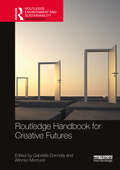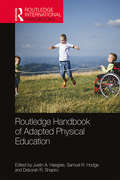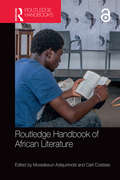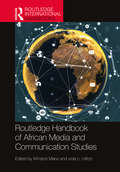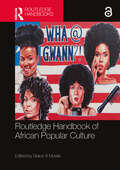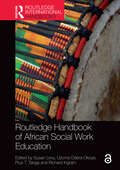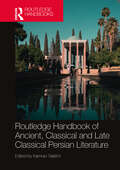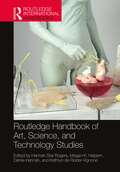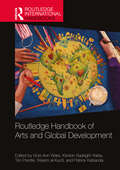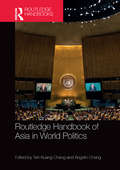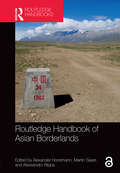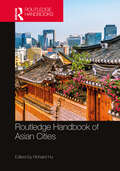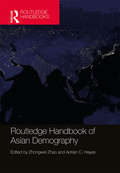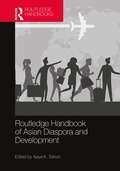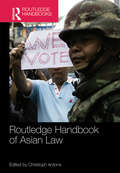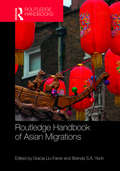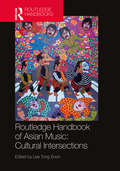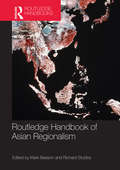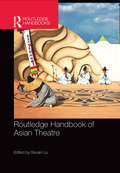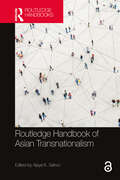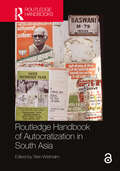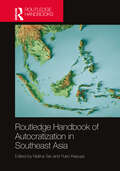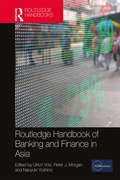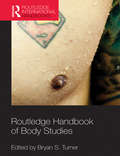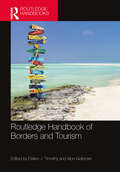- Table View
- List View
Routledge Handbook for Creative Futures (Routledge Environment and Sustainability Handbooks)
by Gabrielle Donnelly Alfonso MontuoriAs the uncertainty of global and local contexts continues to amplify, the Routledge Handbook for Creative Futures responds to the increasing urgency for reimagining futures beyond dystopias and utopias. It features essays that explore the challenges of how to think about compelling futures, what these better futures might be like, and what personal and collective practices are emerging that support the creation of more desirable futures. The handbook aims to find a sweet spot somewhere between despair and naïve optimism, neither shying away from the massive socio-environmental planetary challenges currently facing humanity nor offering simplistic feel-good solutions. Instead, it offers ways forward—whether entirely new perspectives or Indigenous and Traditional Knowledge perspectives that have been marginalized within modernity—and shares potential transformative practices. The volume contains contributions from established and emerging scholars, practitioners, and scholar-practitioners with diverse backgrounds and experiences: a mix of Indigenous, Black, Asian, and White/Caucasian contributors, including women, men, and trans people from around the world, in places such as Kenya, India, US, Canada, and Switzerland, among many others. Chapters explore critical concepts alongside personal and collective practices for creating desirable futures at the individual, community, organizational, and societal levels. This scholarly and accessible book will be a valuable resource for researchers and students of leadership studies, social innovation, community and organizational development, policy studies, futures studies, cultural studies, sociology, and management studies. It will also appeal to educators, practitioners, professionals, and policymakers oriented toward activating creative potential for life-affirming futures for all.
Routledge Handbook of Adapted Physical Education (Routledge International Handbooks)
by Samuel R. Hodge Justin A. Haegele Deborah R. ShapiroThis handbook represents the first comprehensive and evidence-based review of theory, research, and practice in the field of adapted physical education (APE). Exploring philosophical and foundational aspects of APE, the book outlines the main conceptual frameworks informing research and teaching in this area, and presents important material that will help shape best practice and future research. Written by world-leading researchers, the book introduces the key themes in APE, such as historical perspectives on disability, disability and the law, language, and measurement. It examines the most significant theoretical frameworks for understanding APE, from embodiment and social cognitive theory to occupational socialization, and surveys current debates and practical issues in APE, such as teacher training, the use of technology, and physical inactivity and health. Acknowledging the importance of the voices of children, parents and peers, the book also explores research methods and paradigms in APE, with each chapter including directions for further research. Offering an unprecedented wealth of material, the Routledge Handbook of Adapted Physical Education is an essential reference for advanced students, researchers and scholars working in APE, and useful reading for anybody with an interest in disability, physical education, sports coaching, movement science or youth sport.
Routledge Handbook of African Literature
by Carli Coetzee Moradewun AdejunmobiThe turn of the twenty-first century has witnessed an expansion of critical approaches to African literature. The Routledge Handbook of African Literature is a one-stop publication bringing together studies of African literary texts that embody an array of newer approaches applied to a wide range of works. This includes frameworks derived from food studies, utopian studies, network theory, eco-criticism, and examinations of the human/animal interface alongside more familiar discussions of postcolonial politics. The handbook is divided into seven parts, i) Mapping political agencies ii) Journeys, geographies, identities iii) Working through genre iv) The world of and beyond humans v) Everyday sociality vi) Bodies, subjectivities, affect vii) Literary networks. In each, contributors address the themes of the section from a variety of perspectives in conjunction with analysis of different literary texts. Every chapter is an original research essay written by a broad spectrum of scholars with expertise in the subject, providing an application of the most recent insights into analysis of particular topics or application of particular critical frameworks to one or more African literary works. The handbook will be a valuable interdisciplinary resource for scholars and students of African literature, African culture, postcolonial literature and literary analysis.
Routledge Handbook of African Media and Communication Studies
by Winston Mano Viola C. MiltonThis handbook comprises fresh and incisive research focusing on African media, culture and communication. The chapters from a cross-section of scholars dissect the forces shaping the field within a changing African context. It adds critical corpora of African scholarship and theory that places the everyday worlds, needs and uses of Africans first. The book goes beyond critiques of the marginality of African approaches in media and communication studies to offer scholars the theoretical and empirical toolkit needed to start building critical corpora of African scholarship and theory that places the everyday worlds, needs and uses of Africans first. Decoloniality demands new epistemological interventions in African media, culture and communication, and this book is an important interlocutor in this space. In a globally interconnected world, changing patterns of authority and power pose new challenges to the ways in which media institutions are constituted and managed, as well as how communication and media policy is negotiated and the manner in which citizens engage with increasing media opportunities. The handbook focuses on the interrelationships of the local and the global and the concomitant consequences for media practice, education and citizen engagement in today’s Africa. Altogether, the book foregrounds convivial epistemologies relevant for locating African media and communication in the pluriverse. This handbook is an essential read for critical media, communications, cultural studies and journalism scholars.
Routledge Handbook of African Popular Culture
by Grace A MusilaThis handbook brings together an international team of scholars from different disciplines to reflect on African popular cultural imaginaries. These imaginaries – in the sense of cultural productions, contexts, consumers, producers, platforms, and the material, affective and discursive resources they circulate – are influential in shaping African realities. Collectively, the chapters assembled in this handbook index the genres, methods, mediums, questions and encounters that preoccupy producers, consumers and scholars of African popular cultural forms across a range of geohistorical and temporal contexts. Drawing on forms such as newspaper columns, televised English Premier League football, speculative arts, romance fiction, comedy, cinema, music and digital genres, the contributors explore the possibilities and ambiguities unleashed by the production, circulation, consumption, remediation and critique of these forms. Among the questions explored across these essays are the freedoms and constraints of popular genres; the forms of self-making, pleasure and harm that these imaginaries enable; the negotiations of multiple moral regimes in everyday life; and, inevitably, the fecund terrain of contradictions definitive of many popular forms, which variously enable and undermine world-making. An authoritative scholarly resource on popular culture in Africa, this handbook is an essential read for students and scholars of African culture, society and media.
Routledge Handbook of African Social Work Education (Routledge International Handbooks)
by Susan Levy, Uzoma Odera Okoye, Pius T. Tanga and Richard IngramThis timely Routledge Handbook creates a much-needed space to explore what makes social work uniquely African, as well as shaping, informing, and influencing a new culturally relevant era of social work. The specific focus on social work education offers approaches to transition away from the hegemony of Western literature, knowledge, and practice models underpinning African social work education. The authors identify what is relevant and meaningful to inform, influence, and reconceptualise culturally relevant social work curriculum. Covering Botswana, Cameroon, Ethiopia, Ghana, Guinea, Kenya, Malawi, Nigeria, South Africa, Tanzania, Uganda, Zambia, and Zimbabwe, the Handbook comprises both empirical and conceptual chapters, multiple approaches, case studies, and key debates on social work education. It is structured in four parts:• Approaches to Indigenising, Decolonising and Developing Culturally Relevant Social Work Education• Social Work Education: Evolution across Contexts• Embedding Field Practicum into Social Work Education• Knowledge Exchange between the Global South and Global North.The range of indigenous, local knowledge that the Handbook presents is crucial to social work evolving and facilitating for reciprocal learning and knowledge exchange between the Global South and Global North. Whilst the context of the Handbook is Africa, the topics covered are relevant to a global audience engaged in social justice work across social work, social welfare, social development, and sustainability.
Routledge Handbook of Ancient, Classical and Late Classical Persian Literature
by Kamran TalattofRoutledge Handbook of Ancient, Classical, and Late Classical Persian Literature contains scholarly essays and sample texts related to Persian literature from 650BCE through the sixteenth century CE. It includes analyses of some seminal ancient texts and the works of numerous authors of the classical period. The chapters apply a disciplinary or an interdisciplinary approach to the many movements, genres, and works of the long and evolving body of Persian literature produced in the Persianate World. These collections of scholarly essays and samples of Persian literary texts provide facts (general information), instructions (ways to understand, analyze, and appreciate this body of works), and the field's state-of-the-art research (the problematics of the topics) regarding one of the most important and oldest literary traditions in the world. Thus, the handbook’s chapters and related texts provide scholars, students, and admirers of Persian poetry and prose with practical and direct access to the intricacies of the Persian literary world through a chronological account of key moments in the formation of this enduring literary tradition. The related handbook (also edited by Kamran Talattof), Routledge Handbook of Post Classical and Contemporary Persian Literature covers Persian literary works from the 17th century to the present.
Routledge Handbook of Art, Science, and Technology Studies
by Hannah Star RogersArt and science work is experiencing a dramatic rise coincident with burgeoning Science and Technology Studies (STS) interest in this area. Science has played the role of muse for the arts, inspiring imaginative reconfigurations of scientific themes and exploring their cultural resonance. Conversely, the arts are often deployed in the service of science communication, illustration, and popularization. STS scholars have sought to resist the instrumentalization of the arts by the sciences, emphasizing studies of theories and practices across disciplines and the distinctive and complementary contributions of each. The manifestation of this commonality of creative and epistemic practices is the emergence of Art, Science, and Technology Studies (ASTS) as the interdisciplinary exploration of art–science.This handbook defines the modes, practices, crucial literature, and research interests of this emerging field. It explores the questions, methodologies, and theoretical implications of scholarship and practice that arise at the intersection of art and STS. Further, ASTS demonstrates how the arts are intervening in STS. Drawing on methods and concepts derived from STS and allied fields including visual studies, performance studies, design studies, science communication, and aesthetics and the knowledge of practicing artists and curators, ASTS is predicated on the capacity to see both art and science as constructions of human knowledge- making. Accordingly, it posits a new analytical vernacular, enabling new ways of seeing, understanding, and thinking critically about the world.This handbook provides scholars and practitioners already familiar with the themes and tensions of art–science with a means of connecting across disciplines. It proposes organizing principles for thinking about art–science across the sciences, social sciences, humanities, and arts. Encounters with art and science become meaningful in relation to practices and materials manifest as perceptual habits, background knowledge, and cultural norms. As the chapters in this handbook demonstrate, a variety of STS tools can be brought to bear on art–science so that systematic research can be conducted on this unique set of knowledge-making practices.
Routledge Handbook of Arts and Global Development (Routledge International Handbooks)
by Tim Prentki Patrick Kabanda Kirsten Sadeghi-Yekta Vicki-Ann Ware Wasim Al KurdiThis book brings together a leading team of international experts in arts and global development to showcase effective practice and to explore how this vibrant interdisciplinary field has developed and what the latest research can teach us.Although arts play a central role in human development, and in the health and wellbeing of individuals and communities, few have attempted to comprehensively explore arts practice as global development. This Handbook first provides a theoretical framework for exploring arts and global development, before surveying a comprehensive range of art forms and development practices to explore the potential of the arts to strategically and beneficially contribute to more just and equitable conditions for communities across the globe. Stretching across the arts from theatre, dance, and music to poetry, film, and visual arts, the book covers topics as diverse as health, education, peacebuilding, livelihoods, sustainability, activism, and arts as research method in programming. The Handbook also identifies gaps in the literature, pointing towards the most pressing and promising avenues for further research over the next few years.This book will be an essential resource for any researcher, student, or practitioner wishing to understand the role of the arts in global development and in the global south more generally.
Routledge Handbook of Asia in World Politics
by Teh-Kuang Chang and Angelin ChangAsia is a complex and diverse continent, which has seen the scope and pace of transformation increase rapidly over the past 30 years. In turn, the economic growth and social change seen in the region, combined with new global security profiles and environmental challenges, have contributed to placing Asia at the forefront of international affairs. This Handbook brings together leading scholars of different disciplines, including Politics and International Relations, Security Studies and Law, to provide a comprehensive analysis of both the prospects and problems which have emerged from Asia’s rise. Examining how developments across the continent have influenced global politics and how the region has responded to the international community in the modern era, the sections cover: Major actors in Asian politics, especially China, Japan and India, International relations in Asia and intra-Asian tensions Special issues of world politics in Asia including modern conflicts in and attitudes towards the Middle East The Routledge Handbook of Asia in World Politics will be useful to students and scholars of Global Politics, International Relations and Asian Studies.
Routledge Handbook of Asian Borderlands
by Alexander Horstmann Martin Saxer Alessandro RippaIn Asia, where authoritarian-developmental states have proliferated, statehood and social control are heavily contested in borderland spaces. As a result, in the post-Cold War world, borders have not only redefined Asian incomes and mobilities, they have also rekindled neighbouring relations and raised questions about citizenship and security. The contributors to the Routledge Handbook of Asian Borderlands highlight some of these processes taking place at the fringe of the state. Offering an array of comparative perspectives of Asian borders and borderlands in the global context, this handbook is divided into thematic sections, including: Livelihoods, commodities and mobilities Physical land use and agrarian transformations Borders and boundaries of the state and the notion of statelessness Re-conceptualizing trade and the economy in the borderlands The existence and influence of humanitarians, religions, and NGOs The militarization of borderlands Causing us to rethink and fundamentally question some of the categories of state, nation, and the economy, this is an important resource for students and scholars of Asian Studies, Border Studies, Social and Cultural Studies, and Anthropology.
Routledge Handbook of Asian Cities
by Richard HuThis handbook provides the most comprehensive examination of Asian cities—developed and developing, large and small—and their urban development. Investigating the urban challenges and opportunities of cities from every nation in Asia, the handbook engages not only the global cities like Shanghai, Tokyo, Singapore, Seoul, and Mumbai but also less studied cities like Dili, Malé, Bandar Seri Begawan, Kabul, and Pyongyang. The handbook discusses Asian cities in alignment to the United Nations’ New Urban Agenda and Sustainable Development Goals in order to contribute to global policy debates. In doing so, it critically reflects on the development trajectories of Asian cities and imagines an urban future, in Asia and the world, in the post-sustainable, post-global, and post-pandemic era. Presenting 43 chapters of original, insightful research, this book will be of interest to scholars, practitioners, students, and general readers in the fields of urban development, urban policy and planning, urban studies, and Asian studies.
Routledge Handbook of Asian Demography
by Zhongwei Zhao Adrian C. HayesHome to close to 60 per cent of the world’s population, Asia is the largest and by far the most populous continent. It is also extremely diverse, physically and culturally. Asian countries and regions have their own distinctive histories, cultural traditions, religious beliefs and political systems, and they have often pursued different routes to development. Asian populations also present a striking array of demographic characteristics and stages of demographic transition. This handbook is the first to provide a comprehensive study of population change across the whole of Asia. Comprising 28 chapters by more than 40 international experts this handbook examines demographic transitions on the continent, their considerable variations, their causes and consequences, and their relationships with a wide range of social, economic, political and cultural processes. Major topics covered include: population studies and sources of demographic data; historical demography; family planning and fertility decline; sex preferences; mortality changes; causes of death; HIV/AIDS; population distribution and migration; urbanization; marriage and family; human capital and labour force; population ageing; demographic dividends; political demography; population and environment; and Asia’s demographic future. This handbook provides an authoritative and comprehensive reference for researchers, policymakers, academics, students and anyone who is interested in population change in Asia and the world.
Routledge Handbook of Asian Diaspora and Development
by Ajaya K. SahooThis handbook offers an analysis of Asian diaspora and development, and explores the role that immigrants living within diasporic and transnational communities play in the development of their host countries and their homeland. Bringing together an array of interdisciplinary scholars from across the world, the handbook is divided into the following sections: • Development Potential of Asian Diasporas• Diaspora, Homeland, and Development• Gender, Generation, and Identities• Soft Power, Mobilization, and Development• Media, Culture, and Representations. Presenting cutting-edge research on several dimensions of diaspora and development, Routledge Handbook of Asian Diaspora and Development provides a platform for further discussion in the fields of migration studies, diaspora studies, transnational studies, race relations, ethnic studies, gender studies, globalization, Asian studies, and research methods.
Routledge Handbook of Asian Law
by Christoph AntonsThe Routledge Handbook of Asian Law is a cutting-edge and comprehensive resource which surveys the interdisciplinary field of Asian Law. Written by an international team of experts, the chapters within cover issues as diverse as family law and Islamic courts, decentralisation and the revival of traditional forms of law, discourses on the rule of law, human rights, corporate governance and environmental protection The volume is divided into five parts covering: Asia in Law, and the Humanities and Social Sciences; The Political Economy of Law in Asia - Law in the Context of Asian Development; Asian traditions and their transformations; Law, the environment, and access to land and natural resources; People in Asia and their rights. Offering an overview of the full spectrum of Law in Asia, the Handbook is an invaluable resource for academics, researchers, lawyers, graduate and undergraduate students studying this ever-evolving field.
Routledge Handbook of Asian Migrations
by Gracia Liu-Farrer Brenda S.A. YeohHousing more than half of the global population, Asia is a region characterised by increasingly diverse forms of migration and mobility. Offering a wide-ranging overview of the field of Asian migrations, this new handbook therefore seeks to examine and evaluate the flows of movement within Asia, as well as into and out of the continent. Through in-depth analysis of both empirical and theoretical developments in the field, it includes key examples and trends such as British colonialism, Chinese diaspora, labour migration, the movement of women, and recent student migration. Organised into thematic parts, the topics cover: The historical context to migration in Asia Modern Asian migration pathways and characteristics The reconceptualising of migration through Asian experiences Contemporary challenges and controversies in Asian migration practice and policy Contributing to the retheorising of the subject area of international migration from non-western experience, the Routledge Handbook of Asian Migrations will be useful to students and scholars of migration, Asian development and Asian Studies in general.
Routledge Handbook of Asian Music: Cultural Intersections
by Lee Tong SoonThe Routledge Handbook of Asian Music: Cultural Intersections introduces Asian music as a way to ask questions about what happens when cultures converge and how readers may evaluate cultural junctures through expressive forms. The volume’s thirteen original chapters cover musical practices in historical and modern contexts from Central Asia, East Asia, South Asia, and Southeast Asia, including art music traditions, folk music and composition, religious and ritual music, as well as popular music. These chapters showcase the diversity of Asian music, requiring readers to constantly reconsider their understanding of this vibrant and complex area. The book is divided into three sections: Locating meanings Boundaries and difference Cultural flows Contributors to the book offer a multidisciplinary portfolio of methods, ranging from archival research and field ethnography to biographical studies and music analysis. In addition to rich illustrations, numerous samples of notation and sheet music are featured as insightful study resources. Readers are invited to study individuals, music-makers, listeners, and viewers to learn about their concerns, their musical choices, and their lives through a combination of humanistic and social-scientific approaches. Demonstrating how transformative cultural differences can become in intercultural encounters, this book will appeal to students and scholars of musicology, ethnomusicology, and anthropology.
Routledge Handbook of Asian Regionalism
by Mark Beeson Richard StubbsThe Routledge Handbook of Asian Regionalism is a definitive introduction to, and analysis of, the development of regionalism in Asia, including coverage of East Asia, Southeast Asia and South Asia. The contributors engage in a comprehensive exploration of what is arguably the most dynamic and important region in the world. Significantly, this volume addresses the multiple manifestations of regionalism in Asia and is consequently organised thematically under the headings of: conceptualizing the region economic issues political issues strategic issues regional organizations As such, the Handbook presents some of the key elements of the competing interpretations of this important and highly contested topic, giving the reader a chance to evaluate not just where Asian regionalism is going but also how the scholarship on Asian regionalism is analysing these trends and events. This book will be an indispensable resource for students and scholars of Asian politics, international relations and regionalism.
Routledge Handbook of Asian Theatre
by Siyuan LiuRoutledge Handbook of Asian Theatre is an advanced level reference guide which surveys the rich and diverse traditions of classical and contemporary performing arts in Asia, showcasing significant scholarship in recent years. An international team of over 50 contributors provide authoritative overviews on a variety of topics across Asia, including dance, music, puppetry, make-up and costume, architecture, colonialism, modernity, gender, musicals, and intercultural Shakespeare. This volume is divided into four sections covering: Representative Theatrical Traditions in Asia. Cross-Regional Aspects of Classical and Folk Theatres. Modern and Contemporary Theatres in Asian Countries. Modernity, Gender Performance, Intercultural and Musical Theatre in Asia. Offering a cutting edge overview of Asian theatre and performance, the Handbook is an invaluable resource for academics, researchers and students studying this ever-evolving field.
Routledge Handbook of Asian Transnationalism
by Ajaya K. SahooThis handbook presents cutting-edge research on Asian transnationalism written by experts in the areas of migration, diaspora, ethnicity, gender, language, education, politics, media, art, popular culture and literature from diverse theoretical and methodological perspectives. The Asian region not only constitutes one of the largest diasporic populations in the world but also the most diversified diasporas in terms of their historical trajectories of emigration, geographical spread, economic and political strength, socio-cultural integration in the host country and transnational engagement with the homeland. Divided thematically into six broad sections, the chapters in this handbook critically discuss and debate some of the pertinent issues of Asian transnationalism: Contextualizing Asian Transnationalism Transnationalism and Socio-Cultural Identities Transnationalism, Education and Infrastructure Transnationalism, Gender and Development Transnationalism and Dynamics of Diasporic Politics Transnationalism, Art and Media The Routledge Handbook of Asian Transnationalism will be an invaluable resource for academics, researchers and students interested in the study of international migration, Asian diaspora and transnationalism.
Routledge Handbook of Autocratization in South Asia
by Sten WidmalmThis handbook offers a comprehensive analysis of the processes and actors contributing to autocratization in South Asia. It provides an enhanced understanding of the interconnectedness of the different states in the region, and how that may be related to autocratization. The book analyzes issues of state power, the support for political parties, questions relating to economic actors and sustainable economic development, the role of civil society, questions of equality and political culture, political mobilization, the role of education and the media, as well as topical issues such as the Covid pandemic, environmental issues, migration, and military and international security. Structured in five sections, contributions by international experts describe and explain outcomes at the national level in India, Pakistan, Bangladesh and Sri Lanka. The final section analyzes conditions for democracy and autocratization and how they are affected by the interplay of political forces at the international level in this region. India – building an ethnic state? Pakistan – the decline of civil liberties Bangladesh – towards one-party rule Sri Lanka – the resilience of the ethnic state How to comprehend autocratization in South Asia – three broad perspectives This innovative handbook is the first to describe and to explain ongoing trends of autocratization in South Asia, demonstrating that drivers of political change also work across boundaries. It is an important reference work for students and researchers of South Asian Studies, Asian Studies, Area Studies and Political Science. The Open Access version of this book, available at http://www.taylorfrancis.com, has been made available under a Creative Commons Attribution-Non Commercial-No Derivatives 4.0 license.
Routledge Handbook of Autocratization in Southeast Asia
by Edited by Netina Tan and Yuko KasuyaThe Routledge Handbook of Autocratization in Southeast Asia examines how global and domestic forces of autocratization affect regional and local politics. It analyzes how the interactions of international and domestic factors affect actors and institutions in both democracies and autocracies in the region.Bringing together a representative slate of both local and international, junior and senior scholars of different methodological backgrounds, this Handbook cross-examines regional trends and provides an insider view of the causes and effects of autocratization in a region with diverse experiences with de-colonization, state-building, and economic and political developments. The 28 chapters are organized into three sections. Part I examines a range of structural, international, socio-political, technological, and ideological causal factors of autocratization. Part II offers a comparative analysis of the consequences of autocratization on key actors and democratic institutions. Part III provides a more detailed study of autocratic consolidation and pushback in each country in Southeast Asia. Taking into account structural-historical, institutional, and cultural factors, the contributors analyze how domestic actors and democratic institutions withstand the global forces of autocratization.This Handbook fills empirical gaps in the current scholarship by focusing on all nation-states in the Association of Southeast Asia Nations and Timor-Leste, varied regime types with diverse socio-religious backgrounds. It is the first authoritative reference work dedicated to Southeast Asia’s autocratization and will be an indispensable reference work for academics and policymakers interested in democracy and autocracy, regime transition, and Southeast Asian politics.
Routledge Handbook of Banking and Finance in Asia
by Naoyuki Yoshino Peter J. Morgan Ulrich VolzThe Routledge Handbook of Banking and Finance in Asia brings together leading scholars, policymakers, and practitioners to provide a comprehensive and cutting-edge guide to Asia’s financial institutions, markets, and systems. Part I provides a country-by-country overview of banking and finance in East, Southeast, and South Asia, including examples from China, Japan, Hong Kong, India, and Singapore. Part II contains thematic chapters, covering topics such as commercial banking, development banking, infrastructure finance, stock markets, insurance, and sovereign wealth funds. It also includes examinations of banking regulation and supervision, and analyses of macroprudential regulation, capital flow management measures, and monetary policy. Finally, it provides new insights into topical issues such as SME, green, and Islamic finance. This handbook is an essential resource for scholars and students of Asian economics and finance and for professionals working in financial markets in Asia.
Routledge Handbook of Body Studies (Routledge International Handbooks)
by Bryan S. TurnerIn the last three decades, the human body has gained increasing prominence in contemporary political debates, and it has become a central topic of modern social sciences and humanities. Modern technologies – such as organ transplants, stem-cell research, nanotechnology, cosmetic surgery and cryonics – have changed how we think about the body. In this collection of thirty original essays by leading figures in the field, these issues are explored across a number of theoretical and disciplinary perspectives, including pragmatism, feminism, queer theory, post-modernism, post-humanism, cultural sociology, philosophy and anthropology. A wide range of case studies, which include cosmetics, diet, organ transplants, racial bodies, masculinity and sexuality, eating disorders, religion and the sacred body, and disability, are used to appraise these different perspectives. In addition, this Handbook explores various epistemological approaches to the basic question: what is a body? It also offers a strongly themed range of chapters on empirical topics that are organized around religion, medicine, gender, technology and consumption. It also contributes to the debate over the globalization of the body: how have military technology, modern medicine, sport and consumption led to this contemporary obsession with matters corporeal? The Handbook’s clear, direct style will appeal to a wide undergraduate audience in the social sciences, particularly for those studying medical sociology, gender studies, sports studies, disability studies, social gerontology, or the sociology of religion. It will serve to consolidate the new field of body studies.
Routledge Handbook of Borders and Tourism
by Dallen J. Timothy Alon GelbmanThe Routledge Handbook of Borders and Tourism examines the multiple and diverse relationships between global tourism and political boundaries. With contributions from international, leading thinkers, this book offers theoretical frameworks for understanding borders and tourism and empirical examples from borderlands throughout the world. This handbook provides comprehensive overview of historical and contemporary thinking about evolving national frontiers and tourism. Tourism, by definition, entails people crossing borders of various scales and is manifested in a wide range of conceptualizations of human mobility. Borders significantly influence tourism and determine how the industry grows, is managed, and manifests on the ground. Simultaneously, tourism strongly affects borders, border laws, border policies, and international relations. This book highlights the traditional relationships between borders and tourism, including borders as attractions, barriers, transit spaces, and determiners of tourism landscapes. It offers deeper insights into current thinking about space and place, mobilities, globalization, citizenship, conflict and peace, trans-frontier cooperation, geopolitics, "otherness" and here versus there, the heritagization of borders and memory-making, biodiversity, and bordering, debordering, and re-bordering processes. Offering an unparalleled interdisciplinary glimpse at political boundaries and tourism, this handbook will be an essential resource for all students and researchers of tourism, geopolitics and border studies, geography, anthropology, sociology, history, international relations, and global studies.
